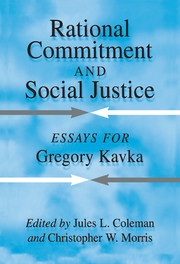Book contents
- Frontmatter
- Contents
- Acknowledgments
- List of Contributors
- Introduction: The Moral and Political Philosophy of Gregory Kavka
- Some Personal Memories
- The Shadow of the Future
- A New Paradox of Deterrence
- Rethinking the Toxin Puzzle
- Toxin, Temptation, and the Stability of Intention
- The Toxin Puzzle
- Religion and Morality in Hobbes
- Contemporary Uses of Hobbes's Political Philosophy
- The Knavish Humean
- Some Considerations in Favor of Contractualism
- Justice, Reasons, and Moral Standing
- Wrongful Life: Paradoxes in the Morality of Causing People to Exist
- Gregory S. Kavka's Writings
Introduction: The Moral and Political Philosophy of Gregory Kavka
Published online by Cambridge University Press: 28 October 2009
- Frontmatter
- Contents
- Acknowledgments
- List of Contributors
- Introduction: The Moral and Political Philosophy of Gregory Kavka
- Some Personal Memories
- The Shadow of the Future
- A New Paradox of Deterrence
- Rethinking the Toxin Puzzle
- Toxin, Temptation, and the Stability of Intention
- The Toxin Puzzle
- Religion and Morality in Hobbes
- Contemporary Uses of Hobbes's Political Philosophy
- The Knavish Humean
- Some Considerations in Favor of Contractualism
- Justice, Reasons, and Moral Standing
- Wrongful Life: Paradoxes in the Morality of Causing People to Exist
- Gregory S. Kavka's Writings
Summary
Gregory Kavka was a remarkable philosopher, certainly, to have written so many distinguished essays and books in his short life, for he was only forty-six when he died on February 16, 1994. Even greater testimony to his exceptional nature as a thinker may be his influence on contemporary moral and political philosophy. His contributions to several areas of practical philosophy are significant. His work falls into four overlapping areas: (1) the ethics of war – in particular, the ethics and rationality of nuclear policy; (2) the general theory of rational choice; (3) Hobbes studies; and (4) various topics in moral theory, applied ethics, and policy. In each of these areas his contributions have been striking and have opened new areas of thought.
Kavka wrote extensively about the ethics of war and of defense, especially nuclear conflict and its deterrence. His writings kindled contemporary interest in the philosophical and ethical issues concerning nuclear war. Most importantly, they showed how wider lessons are to be found in seemingly narrow issues about aspects of nuclear deterrence and policy. In a well-known and widely reprinted essay, “Some Paradoxes of Deterrence” (1978), Kavka showed how certain sorts of deterrent situations give rise to moral difficulties with which our standard accounts are ill equipped to deal. These situations are those in which an agent must intend (conditionally) to harm innocent people in order to forestall some great harm and injustice.
- Type
- Chapter
- Information
- Rational Commitment and Social JusticeEssays for Gregory Kavka, pp. 1 - 8Publisher: Cambridge University PressPrint publication year: 1998

